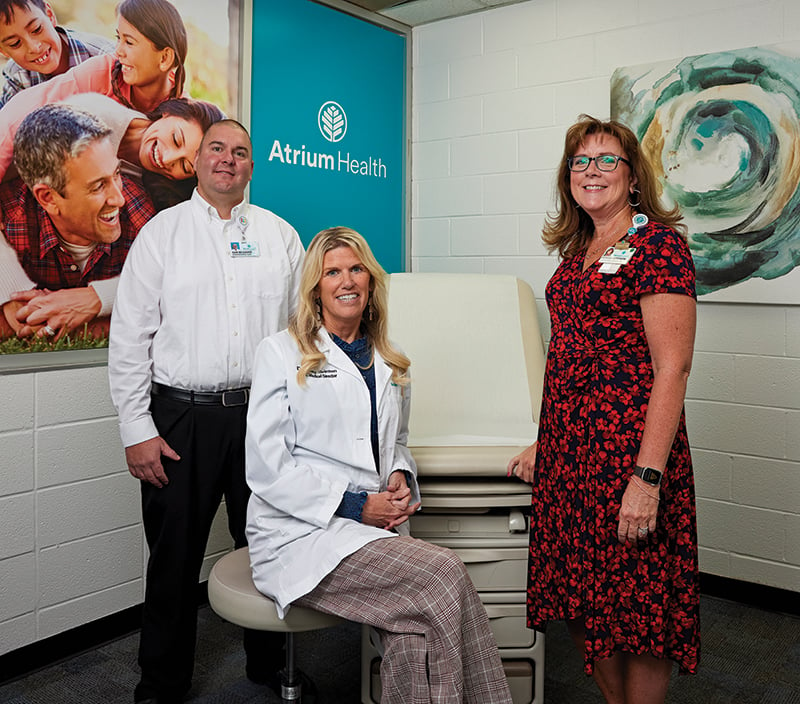2023 Charlotteans of the Year: Atrium Health’s Virtual Clinics
Dr. Patricia Grinton, Donnie Mitchem, and Sam McGinnis are knocking down barriers to care in underserved communities

“We do George Jetson medicine,” Dr. Patricia Grinton tells me over Zoom, a fitting platform to discuss this topic. Grinton is the medical director of Atrium Health’s community-based virtual care clinics, and she uses a tele-stethoscope to listen to a patient’s heart and lungs, a tele-otoscope to see their eardrums, and a high-resolution camera to evaluate their eyes, nose, throat, and skin.
On her screen, alongside her patient, is one of Atrium’s tele-presenters, medical assistants who activate the device that allows Grinton to do the medical exam virtually. “Our tele-presenters are deployed to that site, then I, or someone like me, can make a diagnosis and come up with a treatment plan,” she says. “Think of it as the Uber of health care.”
This is more than just futuristic medicine. Grinton, along with Donnie Mitchem, Sam McGinnis, and their virtual village at Atrium, reach people in underserved communities who need health care but often have trouble getting from home to the examination room because of their health or lack of reliable transportation. Atrium launched its virtual care program in 2017, and it’s grown to encompass much of the Charlotte area, with a focus on communities whose health and well-being is hampered by poverty, unemployment, and lack of education.
Atrium employs more than 60 telepresenters throughout the state who’ve served more than 20,000 people—in schools, faith-based centers, and, as of this year, apartment complexes—since the virtual care clinics began. McGinnis, Atrium’s administrative director, has championed virtual care to school representatives and county health departments. Mitchem, the program director for school-based therapy, added mental health care to their virtual offerings—even before COVID made the virtual component necessary.
Once they began to collect data, Mitchem says, “around 40% of students we’d see had an anxiety disorder. We didn’t see this before COVID—before, it was more behavioral. We’ve seen a shift toward more mood disorders. The need is unprecedented.”
Patients in Grinton’s pediatric clinic often endured delays in diagnoses and treatment because their parents couldn’t take time off from work. Or, she says, they made emergency room visits for simple primary-care issues. In the first year of her virtual care clinic at Graham Elementary in Shelby, the number of ER visits dropped by 55%.
Over the next five years, McGinnis helped establish the school-based program in Anson, Cabarrus, Forsyth, Lincoln, Stanly, and Mecklenburg counties. “We had some phenomenal outcomes,” he says. “Then we got the attention of people who could provide some seed funding for us.”
In 2022, Bank of America allocated $10 million to establish the Meaningful Medicine program, which supports CMS students at Title I schools. Atrium launched the program in 20 elementary schools during the 2022-23 school year, and 10 middle and high schools received behavioral health teletherapy services. When Atrium first expanded services to CMS, students waited as long as six months for mental health care. Now, Mitchem says, the time from referral to the first session is typically 10 days or less.
“I tell my team all the time, ‘We’re hope dealers,’” says Mitchem, who manages 32 licensed clinical therapists. “There’s no group that doesn’t need this right now. In every school, those kids have lived through trauma. That’s one thing we all have to realize.” After witnessing the success of school-based virtual care, teachers, administrators, and parents began requesting the same program for adults. “That’s when we pivoted over,” Grinton says. “It was a perfect model. So we transitioned to the community-based team.”
They began with Mt. Calvary Baptist Church in Shelby in 2021. They expanded to YMCAs and developed a curriculum to train more telepresenters. In 2022, they helped create the country’s first certificate program in telepresentation at Central Piedmont Community College.
In May 2023, the team introduced virtual care to a space where it hadn’t gone before: apartment complexes, beginning with Peppertree Apartments on Central Avenue. Team members arranged the clubhouse like an exam room where a telepresenter conducts video visits with both residents and nonresidents.
As of September, Atrium had added a clinic at the Latin American Coalition to assist immigrant families and set up virtual clinics at 139 schools in seven counties. Within three years, they plan to offer virtual care at 50 CMS schools and behavioral health telemedicine in 31 of them.
“I’m a product of Cleveland County Schools, so it’s been a full-circle journey for me,” McGinnis says. “Families face so many challenges trying to make ends meet. Kids may be going hungry or without medical care. With the technology that we now have, we can fundamentally change the way people receive health care.”
TAYLOR BOWLER is the lifestyle editor.





